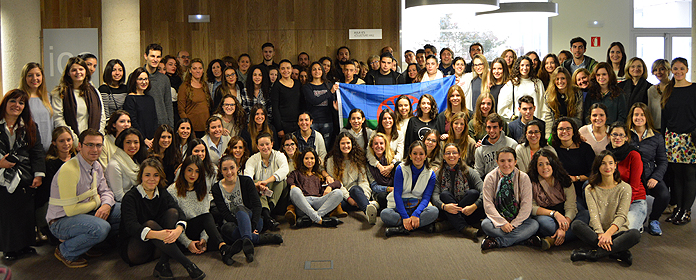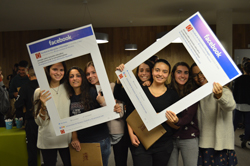Building bridges between communities
Members of the Federation of Gypsy Associations of Navarra Gaz Kaló shared a workshop with students and professors of the University of Navarra.

Inclusion has to be lived". This was the strong opinion of Professor Araceli Arellano, principal investigator of project . The transition to adulthood of young people from the gypsy community in Navarreat the presentation of the workshop on educational inclusion of the gypsy community, held at the University of Navarra.
In the same sense, the teacher of the I.E.S Río Arga (in Peralta), María Carmen de Carlos, stated that a reality cannot be faced if it is unknown "If as teachers we are going to teach, we need to know the reality. How are we going to face the student body gypsy if we do not even know how many there are in our system educational?". The professor, which was part of a roundtable with Javier Arza, member of department of work social of the UPNA; Ricardo Hernández, member of Gaz Kaló and which was moderated by Professor Mª Ángeles Sotés, asked several questions about prejudices and wanted to share her testimony as professor involved in a project of inclusion between gypsy and 'payos' students. This project started 4 years ago and promotes school support among equals: from gypsy students, and payas, to gypsy students. Thanks to this initiative, a good group of students have successfully completed the Education secondary school, obtaining the mandatory degree scroll , goal that a few years ago seemed very far from their reality.
For his part, Javier Arza made a description of the status in which the gypsy community finds itself, reviewing its history, and pointed out some of the lines of intervention established to improve it. Here he emphasized the percentage of students accessing programs of study of Education Secondary and teaching Higher as well as success rates. He also referred to some barriers still present in the system educational that hinder the achievement of inclusion of Roma students. On the other hand, Arza also commented on some of the strengths of the gypsy population, specifically emphasizing the role of the family "as a space for care, learning and socialization".
"Arriving at high school made me privy to another reality."
Ricardo Hernández, coordinator of the Gaz Kaló Federation, addressed the students at the closing of the roundtable and wanted to share with them part of his story: "I was one of the first gypsies to obtain the graduate school certificate. When I arrived at high school, it was the first time I felt I was different. I had as reference letter the historical report that my family had transmitted to me, arriving at high school made me aware of another reality".
Hernandez wanted to take the opportunity to appeal to future teachers: "You have to be very curious, I hope that in this workshop we have awakened your curiosity about the Roma community, and we hope that together we can change this status of discrimination".
The workshop concluded with a workshop in which students of the School of Education and Psychologyand young gypsies from Gaz Kaló (most of them attending Education secondary school), divided into groups, reflected on prejudices, discriminatory behaviors still present in society and proposals for solutions that could be carried out from the field educational.
